If there is one thing that our brand research shows, it is that being seen to be trustworthy and caring/compassionate is not cutting the mustard anymore. Any Comms or Brand professional will tell you a charity brand should be unique and distinctive to differentiate from the many charities trying hard to engage with the same or similar audiences on the same or similar issues. Emotions are key to developing brand personality and activating your existing and potential supporters.
With that in mind here are five charity campaigns that made me…..well, emotional! They raised my awareness of certain issues, made me think about my behaviour and got me engaged.
1. End the Awkward by Scope
The End the Awkward campaign speaks out about attitudes disabled people regularly face. It forces the audience to think about their behaviour around disabled people from a totally unexpected and humorous perspective. And this surprise emotion helps Scope to shift public behaviours and change perspectives of their brand
2. PETA’s Stop Selling Fur campaign
Ashley James (former Made in Chelsea star) paired up PETA to ask Harvey Nichols not to ditch their fur-free policy. This campaign triggers multiple emotions: surprise, anger, disgust, sadness and even some humour. There is of course a fine line when using shocking images in that they may translate into desensitisation and resentment towards the charity, but I don’t think this campaign crosses it.
3. Stop Torture campaign by Amnesty International
Amnesty launched this witty campaign to raise awareness about the international arms equipment fair that took place in London last September. The campaign included posters, leaflets and an ironic video mocking the fair as “the advertising campaign the government didn’t want you to see”. Because it makes us laugh it drives us to action, and to me sharing on social media.
4. Plan UK’s Give Child Marriage the Finger
Plan UK teamed up with the singer Eliza Doolittle to campaign against child marriage. Obviously this is a very emotive issue, impacting millions of girls globally. However, instead of going with the well-trodden path of triggering sadness and running the risk of making this feel ‘unmanageable’ for the public, Plan UK took a very different approach to engage in with its target audience. I think this sort of rightful anger and shock enabled Plan UK to gain wider recognition for standing out.
5. The Pillion Trust’s campaign on poverty
The Pillion Trust created this shocking and controversial campaign to pass on their message ‘We know you care. Please care enough to give.” This video went viral and attracted strong reactions online. Although it divided opinion, it triggered the right emotions by helping to raise £163,734 in donations after it was released.
Although I enjoy some shocking and out of ordinary campaigns from charities, I think there have to be positive campaigns to develop a charity’s personality over the long term. Positive emotions are more likely to help a brand secure lasting public support by instilling trust over the long run.
Do you capture public’s hearts and minds with your brand and campaigns? Do you know how your brand compares to the public’s emotional attachment to other charities? Where do you think your warm audiences would sit in relation to you at a dinner table? Find out about public’s attitudes and perceptions towards your brand by subscribing to Brand Attributes research in March 2016.

